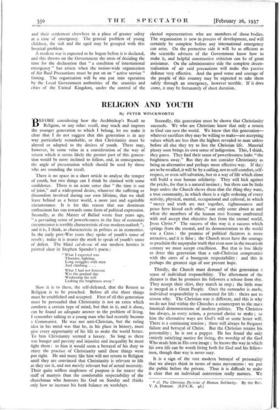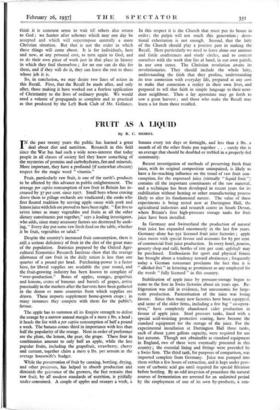RELIGION AND YOUTH
By PETER WINCKWORTH
BEFORE considering how the Archbishop's Recall to Religion, or any other recall, may reach and impress the younger generation to which I belong, let me make it clear that I do not suggest that this generation is in any way particularly remarkable, or that Christianity must be altered or adapted to the desires of youth. There may, however, be some value in a consideration of the way of return which it seems likely the greater part of this genera- tion would be more inclined to follow, and, in consequence, the angle of presentation which should be used by those who are sounding the recall.
There is no space in a short article to analyse the temper of youth, but two things can I think be claimed with some confidence. There is an acute sense that " the time is out of joint," and a widespread desire, _whatever the suffering or discomfort involved during our own lifetime, that we shall leave behind us a better world, a more just and equitable circumstance. It is for this reason that our dominant enthusiasm has run towards some form of political expression. Secondly, as the Master of Balliol wrote four years ago, " a pervading sense of powerlessness in the face of economic circumstance is terribly characteristic of our modern outlook "; and it is, I think, as characteristic in politics as in economics. In the early post-War years they spoke of youth's sense of revolt ; today it is nearer the mark to speak of youth's sense of defeat. The blind cul-de-sac of our modern heroics is painted clear in Stephen Spender's poem :
" What I expected was Thunder, fighting, Long struggles with men And climbing . . .
What I had not foreseen Was the gradual day Weakening the will Leaking the brightness away."
Now it is to these, the self-defeated, that the Return to Religion is to be preached. Before all else three things must be established and accepted. First of all this generation must be persuaded that Christianity is not an extra which comforts a certain type of mind, but that in it, and it alone, can be found an adequate answer to the problem of living. I remember talking to a young man who had recently become a Communist. He was not anti-Christian, but the ruling idea in his mind was that he, in his place in history, must give every opportunity of his life to make the world better. To him Christianity seemed a luxury. So long as there was hunger and poverty and injustice and inequality he must fight them : to him it would seem a betrayal of his duty to enjoy the practice of Christianity until these things were put right. He and many like him will not return to Religion until they are convinced that Christianity is relevant to life as they see it, and not merely relevant but of actual necessity. Their quite selfless singleness of purpose is far nearer the stuff of martyrs than the comfortable respectability of the churchman who honours his God on Sunday and thinks only how to increase his bank balance on weekdays. Secondly, this generation must be shown that Christianity succeeds. We who are Christians know that only a return to God can save the world. We know that this generation— whatever sacrifices they may be willing to make—are accepting values which are less than the highest revealed to man unless before all else they try to live the Christian life. Material plenty soon brings its own sense of indigestion. This, I think, they guess. They find their sense of powerlessness leaks "the brightness away." But they do not consider Christianity as being an alternative and perhaps more effective way. If they are to be recalled, it will be by a calling, not to self-comfort, self- respect, or even self-salvation, but to a way of life which alone will build a true human solidarity. They will kick against the pricks, for that is a natural instinct ; but there can be little hope unless the Church shows them that the thing they want, a true community, in which there is a right ordering of every activity, physical, mental, occupational and cultural, in which " mercy and truth are met together, righteousness and peace have kissed each other," can only conk about as and when the members of the human race becothe confronted with and accept that objective fact from the eternal world, Jesus Christ.* The success of this way is a sticcess which springs from the eternal, and its demonstration to the world was a Cross : the promise of political dictators is more attractive, and it is false ; the Church must have the courage to proclaim the unpopular truth that even now in the twentieth century we must accept crucifixion. But that is less likely to deter this generation than a sub-Christian compromise with the cares of a bourgeois respectability : and this is perhaps the greatest sign of our present hope.
Thirdly, the Church must demand of this generation sense of individual responsibility. The allurement of the dictator is that he promises his followers a release from this. They accept their shirt, they march in step ; the little man is merged in a Great People. Once the surrender is made, individual responsibility is commuted tor life : theirs not to reason why. The Christian way is different, and this is why we do not find within the Churches a counterpart to the mass fanatical demonstrations of modern politics. The Christian has alWays, in every action, a personal choice to make ; to him the alternative ways are God's will or some lesSer will. There is a continuing tension ; there will always be frequent failure and betrayal of Christ. But the Christiah retniiis his personality ; he is not a puppet. He has found the only entirely satisfying motive for living, the worship of the God Who made him in His own image ; he knewS The way in which his own life can be worth living both for God and -his fellow- Men, though that way is never easy.
It is a sign of the vast modern betrayal of personality that we always think in terms of mass movements : we put the public before the private. Thus it is difficult to make it clear that an individual conversion really matters. We * cf. The Christian Do:irine of Flinnan .olidarity. By the Rev. V. A. Demant. (S.P.C.K. 4d.) think it is common sense to wait till others also return to God ; we hanker after schemes which may one day be accepted and which will superimpose centrally a more Christian situation. But that is not the order in which these things will come about. It is for individuals, here and now, at any personal cost, to turn again to God, and to do their own piece of work just in that place in history in which they find' themselves ; for no one can do this for them, and if they will do it, they can leave the rest to those whose job it is.
So, in conclusion, we may desire two lines of action in this Recall. First, that the Recall be made after, and only after, those making it have worked out a fearless application of Christianity to the lives of ordinary people. We would need a volume of propaganda as complete and as practical as that produced by the Left Book Club of Mr. Gollancz. In this respect it is the Church that must put its house in order; the pulpit will not reach this generation ; devo- tional exhortation is not enough. Second, that the laity of the Church should play a positive part in making the Recall. Here particularly we need to leave alone our anxious and futile conferences and study circles, and to content ourselves with the work that lies at hand, in our own parish, in our own street. The Christian revolution awaits its revolutionaries. They should include the whole laity, understanding the faith that they profess, understanding its true connexion with everyday life, prepared at any cost to make that connexion a reality in their own lives, and prepared to tell that faith in simple language to their next- door neighbour. Then a lay apostolate may go forth to sow a great harvest ; and those who make the Recall may learn a lot from those recalled.



















































 Previous page
Previous page